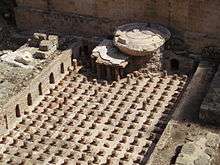Archaeological tourism
Archaeotourism or Archaeological tourism is a form of cultural tourism, which aims to promote public interest in archaeology and the conservation of historical sites.

Archaeological tourism can include all products associated with public archaeological promotion, including visits to archaeological sites, museums, interpretation centers, reenactments of historical occurrences, and the rediscovery of indigenous products, festivals, or theaters.
Archaeological tourism walks a fine line between promoting archaeological sites and an area's cultural heritage and causing more damage to them, thus becoming invasive tourism.[1] Archaeologists have expressed concerns that tourism encourages particular ways of seeing and knowing the past.[2] When archaeological sites are run by tourist boards, ticket fees and souvenir revenues can become a priority, and the question remains whether a site is worth opening to the public or remaining closed and keeping the site out of harm's way.[3] Damage to irreplaceable archaeological materials is not only direct, as when remains are disordered, altered, destroyed, or looted, but often the indirect result of poorly planned development of tourism amenities, such as hotels, restaurants, roads, and shops. These can drastically alter the environment in ways that produce flooding, landslides, or undermine ancient structures.[4]
References
- Messai, Hada (November 8, 2010) "Pompeii's House of the Gladiators collapses Archived January 27, 2011, at the Wayback Machine", CNN.com.
- Uzi Baram 2008 Tourism and Archaeology. In Encyclopedia of Archaeology, edited by Deborah M. Pearsall, pp. 2131-2134. Elsevier
- Mason, Peter (2008). Tourism Impacts, Planning and Management. Burlington, MA: Elsevier Ltd. p. 40. ISBN 978-0-7506-8492-7.
- Comer, Douglas C. (2012). Tourism and Archaeological Heritage Management at Petra: Driver to Development or Destruction?(SpringerBriefs in Archaeology. New York: Springer. ISBN 978-1461414803..
External links sites
- ArqueotuR (2010) Institutional network for the promotion of archaeological tourism and local development. Co-ordinated by the University of Barcelona.
- The AIA-ATTA Guide To Best Practices For Archaeological Tourism